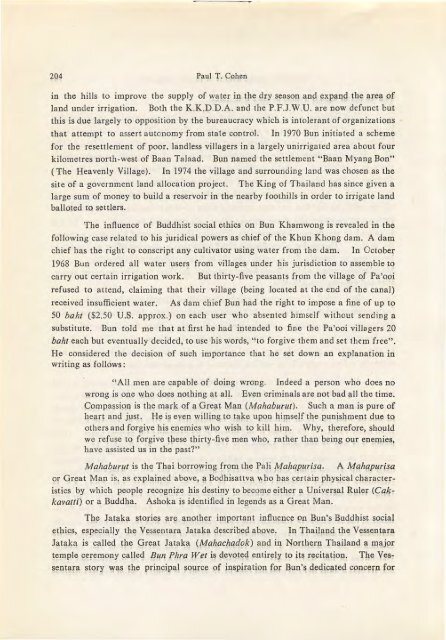The Journal of the Siam Society Vol. LXXII, Part 1-2, 1984 - Khamkoo
The Journal of the Siam Society Vol. LXXII, Part 1-2, 1984 - Khamkoo
The Journal of the Siam Society Vol. LXXII, Part 1-2, 1984 - Khamkoo
You also want an ePaper? Increase the reach of your titles
YUMPU automatically turns print PDFs into web optimized ePapers that Google loves.
204 Paul T. Cohen<br />
in <strong>the</strong> hills to improve <strong>the</strong> supply <strong>of</strong> water in <strong>the</strong> dry season and expand <strong>the</strong> area <strong>of</strong><br />
land under irrigation. Both <strong>the</strong> K.K.D.D.A. and <strong>the</strong> P.F.J.W.U. are now defunct but<br />
this is due largely to opposition by <strong>the</strong> bureaucracy which is intolerant <strong>of</strong> organizations<br />
that attempt to assert autonomy from state control.<br />
In 1970 Bun initiated a scheme<br />
for <strong>the</strong> resettlement <strong>of</strong> poor, landless villagers in a largely unirrigated area a bout four<br />
kilometres north-west <strong>of</strong> Baan Talaad. Bun named <strong>the</strong> settlement "Baan Myang Bon"<br />
(<strong>The</strong> Heavenly Village). In 1974 <strong>the</strong> village and surrounding land was chosen as <strong>the</strong><br />
site <strong>of</strong> a government land allocation project. <strong>The</strong> King <strong>of</strong> Thailand has since given a<br />
large sum <strong>of</strong> money to build a reservoir in <strong>the</strong> nearby foothills in order to irrigate land<br />
balloted to settlers.<br />
<strong>The</strong> influence <strong>of</strong> Buddhist social ethics on Bun Khamwong is revealed in <strong>the</strong><br />
following case related to his juridical powers as chief <strong>of</strong> <strong>the</strong> Khun Khong dam. A dam<br />
chief has <strong>the</strong> right to conscript any cultivator using water from <strong>the</strong> dam. In October<br />
1968 Bun ordered all water users from villages under his jurisdiction to assemble to<br />
carry out certain irrigation work.<br />
But thirty-five peasants from <strong>the</strong> village <strong>of</strong> Pa'ooi<br />
refused to attend, claiming that <strong>the</strong>ir village (being located at <strong>the</strong> end <strong>of</strong> <strong>the</strong> canal)<br />
received insufficient water. As dam chief Bun had <strong>the</strong> right to impose a fine <strong>of</strong> up to<br />
50 baht ($2.50 U .S. approx.) on each user who absented himself without sending a<br />
substitute. Bun told me that at first he had intended to fine <strong>the</strong> Pa'ooi villagers 20<br />
baht each but eventually decided, to use his words, '!to forgive <strong>the</strong>m and set <strong>the</strong>m free".<br />
He considered <strong>the</strong> decision <strong>of</strong> such importance that he set down an explanation in<br />
writing as follows:<br />
"All men are capable <strong>of</strong> doing wrong. Indeed a person who does no<br />
wrong is one who does nothing ~t all. Even criminals are not bad all <strong>the</strong> time.<br />
Compassion is <strong>the</strong> mark <strong>of</strong> a Great Man (Mahaburut). Such a man is pure <strong>of</strong><br />
heart and just. He is even willing to take upon himself <strong>the</strong> punishment due to<br />
o<strong>the</strong>rs and forgive his enemies who wish to kill him. Why, <strong>the</strong>refore, should<br />
we refuse to forgive <strong>the</strong>se thirty-five men who, ra<strong>the</strong>r than being our enemies 1<br />
have assisted us in <strong>the</strong> past?"<br />
Mahaburut is <strong>the</strong> Thai borrowing from <strong>the</strong> Pali Mahapurisa. A Mahapurisa<br />
o~ Great Man is 1<br />
as explained above,~ Bodhisattva \\ho has certain physical characteristics<br />
by which people recogni?e !'J.is destiny to become eitqer a Univer~al Ruler (Cakkavatti)<br />
or a Buddha. Ashoka is identified in legends as a Great Man . .<br />
Th~ Jataka stQries are ano<strong>the</strong>r important influence on Bun's Buddhist social<br />
ethics, especially <strong>the</strong> Vessentara Jataka described above. In Thailand <strong>the</strong> Vessentara<br />
Jataka is calleq <strong>the</strong> Great Jataka (Ma~achadok) anp in Nor~l~erll Thailand a major<br />
temple ceremony called Bufl Phra Wet is devoted entirely to its r.ecitation. <strong>The</strong> Vessentara<br />
story wa~ <strong>the</strong> principal source <strong>of</strong> inspiration for Bun's dedicMed concern for

















